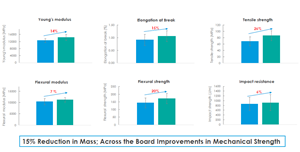At JEC Europe 2015: DSM Composite Resins AG
The Schaffhausen, Switzerland-based resin manufacturer introduced three new offerings to JEC Europe visitors and displayed the latest version of the Human Powered Vehicle, Velox4.
Share
Read Next
DSM Composite Resins AG (Schaffhausen, Switzerland) showed off Velox4, the latest version of The Netherlands' Human Powered Vehicle (see CW's coverage of this vehicle's history under "Editor's Picks" at top right) and show attendees were able to meet the Human Powered Vehicle Team on Wednesday, March 11.
DSM also premiere three new resin products.
The first is tradmarked Beyone 120-Q-01, a styrene-free vinyl ester resin for filament winding applications, which contains photoinitiators to facilitate UV-light curing. The resin reportedly easily impregnates and wets out glass fibers and is cured quickly by application of low-energy UV-light (365-420 nm) or with appropriate conventional curing agents. Composite laminates manufactured with Beyone 120-Q-01 resin are said to be strong and can be used in demanding applications, such as gas pipes for trenchless horizontal drilling installation. “Because of its styrene-free nature, the Beyone 120-Q-1 resin is a highly sustainable material," adds Marta Pascual, DSM's market segment leader for corrosion resistance/food contact. “In addition, the absence of styrene helps to create a better environment for workers and avoids the investment in costly ventilation and emission control equipment.”
The second new product is for electrical and transportation market components that are often used without being painted. Consequently they need to have superior surface quality and aesthetics, which demands dimensional predictability and processing consistency during manufacturing. DSM's solution is new Beyone 820-H-01 low-shrinkage additive for sheet molding compound (SMC) formulations that combine a low-shrinkage feature with excellent pigmentability. The new additive is reportedly unique in that it enables zero shrinkage during cure in combination with homogeneous pigmentation and is, therefore, said to be ideal for making components that need to have color without a painting step. At the same time, the parts are strong and resistant to mechanical impact. Zero shrinkage translates to minimized warpage, excellent dimensional consistency and thus, better fit during final assembly. For OEMs and designers the zero-shrinkage feature also means easier design, because the impact of shrinkage during cure on part dimensions is minimal. This saves time and engineering headaches.
“Formulations with Beyone 820-H-01 feature lower viscosity and as a consequence easier fiber impregnation," contends Peter Hilzendegen, DSM's SMC & BMC market segment leader. “This brings nice benefits like improved mechanical properties and flow control during SMC processing."
A third new product addresses the risk in the near future of potential reclassification of cobalt carboxylates as hazardous. DSM's novel Beyone cobalt-free product line of pre-accelerated resins for hand lay-up and spray-up applications is formulated to provide customers a truly sustainable cobalt-free resin systems that provides desirable end-use performance as well as excellent processing characteristics. The product series is based on trademarked BluCure Technology.
The new Beyone 170, 177 and 185 resin series are based on 0rtho, DCPD and vinyl ester chemistries, respectively. Resins are available for a broad range of applications with different levels of reactivity, and can be optimized for specific customer processes and requirements. The resins may also have LSE functionality for reducing the emission of styrene during resin processing.
Composite components manufactured with Beyone 170, 177 and 185 resin series are reportedly strong and can be used in many structural applications in marine, building, construction, and industrial end-use markets.
“Because of their Cobalt-free nature, these new pre-accelerated Beyone resins are highly sustainable materials,” comments Ad de Koning, DSM's R&D director. “Using these resins for your composite parts now ensures that your manufacturing operation is future-proof for an eventual cobalt carboxylate reclassification, and avoids a costly and time-consuming product requalification down the road.”
Related Content
Composite materials, design enable challenging Corvette exterior components
General Motors and partners Premix-Hadlock and Albar cite creative engineering and a move toward pigmented sheet molding compound (SMC) to produce cosmetic components that met strict thermal requirements.
Read MoreIDI Composites opens new global headquarters, manufacturing and technology center
The Noblesville, Indiana, facility includes SMC and BMC manufacturing, an R&D center and the company’s corporate headquarters.
Read MoreAOC introduces UV-Resistant Automotive System for SMC parts
AOC’s novel formulation, tested in the lab and in real-world environments, delivers a deep black, molded-in color that resists fading and offers high scratch resistance.
Read MoreGraphene-enhanced SMC boosts molded component properties
CAMX 2023: Commercially sold GrapheneBlack SMC from NanoXplore increases part strength, stiffness and provides other benefits for transportation, renewable energy, energy storage and industrial markets.
Read MoreRead Next
VIDEO: High-volume processing for fiberglass components
Cannon Ergos, a company specializing in high-ton presses and equipment for composites fabrication and plastics processing, displayed automotive and industrial components at CAMX 2024.
Read MoreAll-recycled, needle-punched nonwoven CFRP slashes carbon footprint of Formula 2 seat
Dallara and Tenowo collaborate to produce a race-ready Formula 2 seat using recycled carbon fiber, reducing CO2 emissions by 97.5% compared to virgin materials.
Read MorePlant tour: Daher Shap’in TechCenter and composites production plant, Saint-Aignan-de-Grandlieu, France
Co-located R&D and production advance OOA thermosets, thermoplastics, welding, recycling and digital technologies for faster processing and certification of lighter, more sustainable composites.
Read More
























